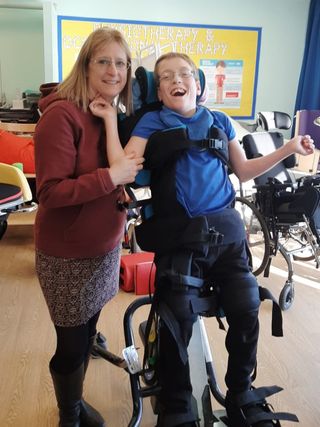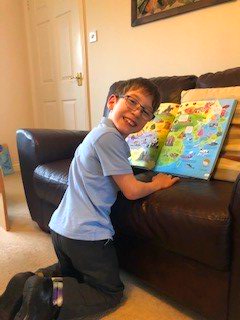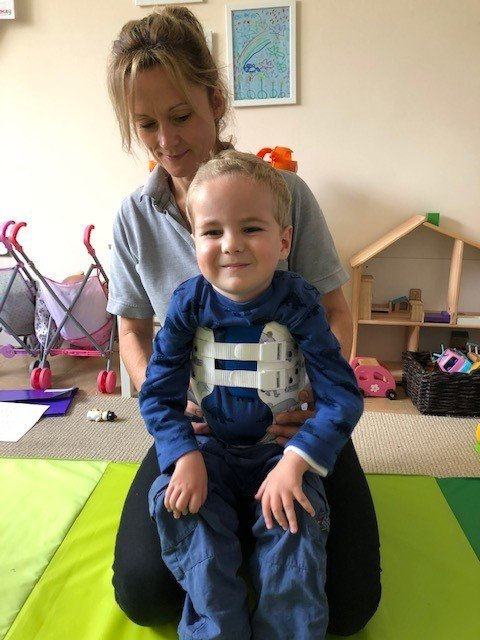How Physiotherapy can help
Children with a wide range of neurological, orthopaedic, musculo-skeletal and developmental conditions can benefit from specialist physiotherapy advice and support.
Common Conditions Treated
Cerebral Palsy is an umbrella term covering a range of movement disorders resulting from damage to a babies brain either before, during or up to one year after birth. The resulting movement difficulties can range from very mild muscle tightness to severe complex needs. Physiotherapy is vital in all cases to ensure the child's maximum functional ability is achieved.
Pre and Post Selective Dorsal Rhizotomy Rehabilitation
Selective Dorsal Rhizotomy is a surgical procedure which aims to relieve spasticity by selectively cutting specific sensory nerve roots in the lower spinal cord. This can be a life altering procedure but relies on extensive physiotherapy post op to achieve results. It is primarily beneficial to children with cerebral palsy. The operation can eliminate spasticity in the lower limbs completely but in doing so unmasks underlying muscle weakness. We have worked with a variety of children who have undergone this procedure and are seeing some fantastic results.
Premature Babies
Babies who are born early often need a bit of help to learn how to move. Their bodies have not experienced the normal experiences in the womb and movement or strength maybe effected. Advice on handling and positioning your baby to optimise development can be very beneficial. Babies born early may also present with other health issues which can benefit from physiotherapy. If you have any concerns with how your baby's movement is developing a physiotherapy assessment can identify any problems and help to maximise development.
Developmental Delay
Developmental Delay is the term used to describe a child who has not reached their developmental milestones at the expected age. Children can experience delay in one area only or in all areas of development. A child experiencing delay in all areas of development is referred to as having Global Developmental Delay. If gross motor delay is identified a physiotherapy assessment will be able to identify the reason for this delay and work to facilitate development.
Congenital Disorders
A congenital disorder is a medical condition that is present at or before birth.
Some congenital disorders are purely physical in nature involving malformation of joints and bones. Such disorders commonly seen by paediatric physiotherapists include talipes, arthrogryposes, spinal deformity, missing limbs, Erbs palsy
Chromosomal Abnormalities
Many children born with genetic conditions benefit from physiotherapy input to maximise their physical development. Conditions commonly seen by our physiotherapist include; Downs Syndrome, Wolf Hirschhorn Syndrome, Trisomy 13, Achondropasia, Rett Syndrome, Cardio-facio-cutaneous syndrome, Joubert Syndrome, Worcester-Drought Syndrome, Kabuki Syndrome, Noonans Syndrome and Williams Syndrome.
Genetic neuro muscular conditions including Spinal Muscular Atrophy, Duchenne Muscular Dystrophy and Becker Muscular Dystrophy specifically effect muscle tissue and benefit from physiotherapy management.
The physical presention of genetic conditions vary hugely. Each chid is assessed thoroughly so their individual needs can be identified and appropriate treatment provided.
Orthopaedic Rehabilitation
Children's bodies are growing and developing all the time. Their skeletal system is vulnerable to a number of specific injuries and affectations unique to childhood as a result of the way the skeleton matures. Many of these painful conditions can be helped by physiotherapy. It is essential that a child presenting with a musculo- skeletal problem is assessed by a specialist paediatric physiotherapist as children are not mini adults and should not be treated as such.
Common paediatric orthopaedic conditions which require physiotherapy include; Perthes Disease, Osgood-Schlatter Disease, Scheuermann's Disease and Severs Disease.
Many children with complex physical needs require orthopaedic surgery during their childhood. Physiotherapy is crucial in ensuring the optimal functional outcome following any such surgery be it tendon lengthening or bony re alignment.
Developmental Co-ordination Difficulties
Developmental Co-ordination Difficulty (DCD) is an umbrella term which includes Dyspraxia. If a child has difficulty co-ordinating movement and does not have a known physical, neurological or behavioural explanation for their difficulty a diagnosis of DCD may be given. DCD can exist alone or may be present in a child who also has learning difficulties. Physiotherapy can be hugely beneficial in helping these children develop strength and stability which will improve their balance, co-ordination and confidence.
Dyspraxia is a very specific movement difficulty in which the child has problems planning, organising and carrying out movements in the right order. Dyspraxia can also affect articulation, speech, perception and thought.
Hypermobility and Joint Hypermobility Syndrome
Children tend to be more flexible than adults. At different stages of development children's joint range and muscle length vary depending on rate of growth and biomechanical pressures.
Many children have excessive range of movement in their joints and this is perfectly normal. If they are experiencing pain in these joints as a result of the extreme joint range available then a physiotherapy assessment is advisable. Once an assessment has been carried out a diagnosis of hypermobility may be made. Exercise and advice is useful in avoiding further joint damage.
A more significant condition, referred to as Joint Hypermobility Syndrome, is occassionaly identified, this conditions can also effect autonomic function, proprioception, intestinal motility and is associated with chronic fatigue and multi joint pain.
Other diagnoses include Ehlers-Danlos Syndrome and Marfans Syndrome.
Acquired Brain Injury
Sudden damage to the brain as a result of trauma, hypoxia (lack of oxygen) or disease, unrelated to any genetic or congenital disorder is classified as an aquired brain injury.
This damage can be mild, moderate or severe and can result in temporary or permanent neurological impairement.
Causes of Acquired Brain Injury in children include; road traffic accidents, sporting injuries, falls, brain tumour, meningitis, near drowning and electricution.
Physiotherapy intervention is required if the child's motor function is affected by the damage to the brain.
Gait Abnormality
Children commonly present with 'unusual' walking patterns. The majority of these conditions are part of normal development and will disappear as the child matures. These incude; knock knees, bow legs, flat feet, toe walking and pigeon toes.
If your child is complaining of pain or functional difficulty i.e. problems with balance, as a result of any of these minor abnormalities, a physiotherapy assessment should be sought.
Hypotonia
Hypotonia is the term used to describe low muscle tone. This can be a benign condition or associated with neurological, genetic or co-ordination difficulties.
Benign hypotonia is a diagnosis given to children with mild hypotonia where no other diagnosis can be made. A child with this condition tends to present as 'floppy' with delayed motor development, abdominal protrusion, flat feet and generalised joint hypermobility. Physiotherapy is valuable in the treatment of all cases of hypotonia.






